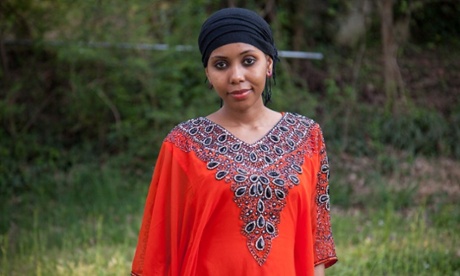
Dukureh, from Atlanta, is leading the campaign to end FGM in the
US. Photograph: Mae Ryan/The Guardian
The United Nations secretary general, Ban Ki-moon described the
practice of female genital mutilation as a “human rights violation” that needed
to end, on the day the Guardian threw its weight behind a campaign against the
practice in the US.
Jaha Dukureh, a
24-year-old American who was mutilated as a child, is leading
the campaign to end FGM in the US with a Change.org
petitionurging the Obama administration to commission a report into
how many women are affected and at risk today.
Dukureh launched the
campaign at the Guardian’s New York office with UN representative Nafissatou
Diop, US congressman Joe Crowley and Guardian editor-in-chief Alan Rusbridger.
“I know it's hard to
believe, but a lot of girls in New York, in Atlanta and throughout America have
been through FGM, and even though our storylines might differ, the pain, trauma
and horror are the same for every single one of us,” Dukureh said.
Dukureh, a mother of
three who lives in Atlanta, was mutilated at a week old in Gambia, where she
was born. Later, as a child bride, she endured the practice of
"reopening", in New York, where she moved when she was 15.
The US government outlawed FGM in 1996, but at least 228,000
women in the US are thought to be affected, according to research from Brigham
and Women’s hospital in Boston.
Sign the petition to end female genital mutilation in the US
Ask President Obama to take the essential first step of
commissioning a report to establish how many American women and girls are at
risk of female genital mutilation. Experts say this is the first step in
tackling a crime that persists despite legislation. UN secretary general Ban
Ki-moon is backing the campaign saying FGM is a "human rights
violation" that must end. Show your support
“At times, I feel like
the government is afraid to address FGM because they fear dealing with our
African cultures,” Dukureh said. “I say: history has taught us to do away with
harmful cultures and traditions. Slavery was a culture in America for over 300
years. If culture is harmful and if culture triggers human rights violations,
then that piece of the culture must go. I am a proud African woman from this
culture, and I say not one single ounce of good comes of mutilating girls.”
Ban Ki-moon endorsed the
campaign, and sent Diop, of the UN’s United National Population (UNFPA) and
Unicef joint program on FGM, to the campaign's launch.
“This is a serious
health and human rights issue,” said Diop, speaking on behalf of Ban. “The
effects include depression, insecurity, pain, infections, incontinence and
deadly complication in pregnancy and childbirth. While some may say FGM is a
tradition, it constitutes a human rights violation that must cease.”
The UN’s program is
aimed at helping those communities that practice FGM to abandon it. “These
agencies have adopted a human rights-based approach to encourage communities to
act collectively, so that girls or their families who opt out do not jeopardize
their marriage prospects or become social outcasts,” Diop said.
Rusbridger said he was hopeful about the campaign’s success in
the US because of the Guardian’s experience in the UK, where Fahma Mohammed, a
young British activist, spearheaded
a campaign that led education secretary Michael Gove to write
to all schools in England and Wales, warning teachers about the dangers of FGM.
"I think the hope
of everybody involved in this field is that it is possible to eradicate this,
and that there is the real, tangible hope of improving the health, expectations
and happiness of million girls and women in more than 30 countries where this
problem affects so many lives,” Rusbridger said.
Crowley, the Democratic
congressman for New York’s 14th district, also spoke at Monday’s event, where
he said he is looking to emulate the work done in the UK.
Crowley is circulating a
letter around Congress, the Department of Health and Human Services, the
Department of Education, and the State Department, calling for greater
awareness among professionals who might come into contact with FGM victims.
·
theguardian.com, Monday
12 May 2014 18.15 EDT
No comments:
Post a Comment